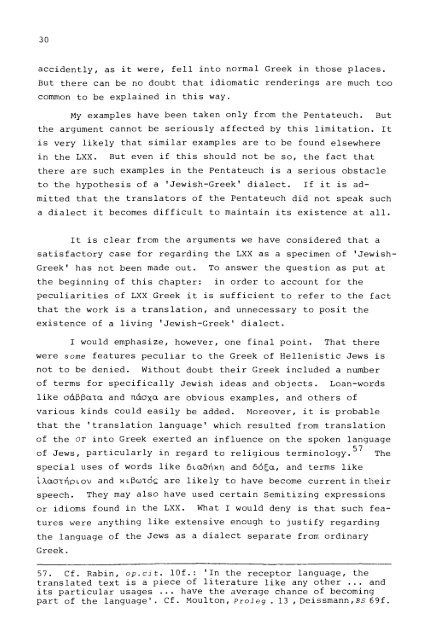A Lexical Study of the Septuagint Version of the Pentateuch
A Lexical Study of the Septuagint Version of the Pentateuch
A Lexical Study of the Septuagint Version of the Pentateuch
You also want an ePaper? Increase the reach of your titles
YUMPU automatically turns print PDFs into web optimized ePapers that Google loves.
accidently, as it were, fell into normal Greek in those places.<br />
But <strong>the</strong>re can be no doubt that idiomatic renderings are much too<br />
common to be explained in this way.<br />
My examples have been taken only from <strong>the</strong> <strong>Pentateuch</strong>. But<br />
<strong>the</strong> argument cannot be seriously affected by this limitation. It<br />
is very likely that similar examples are to be found elsewhere<br />
in <strong>the</strong> LXX. But even if this should not be so, <strong>the</strong> fact that<br />
<strong>the</strong>re are such examples in <strong>the</strong> <strong>Pentateuch</strong> is a serious obstacle<br />
to <strong>the</strong> hypo<strong>the</strong>sis <strong>of</strong> a 'Jewish-Greek' dialect. If it is ad<br />
mitted that <strong>the</strong> translators <strong>of</strong> <strong>the</strong> <strong>Pentateuch</strong> did not speak such<br />
a dialect it becomes difficult to maintain its existence at all.<br />
It is clear from <strong>the</strong> arguments we have considered that a<br />
satisfactory case for regarding <strong>the</strong> LXX as a specimen <strong>of</strong> 'Jewish-<br />
Greek' has not been made out. To answer <strong>the</strong> question as put at<br />
<strong>the</strong> beginning <strong>of</strong> this chapter: in order to account for <strong>the</strong><br />
peculiarities <strong>of</strong> LXX Greek it is sufficient to refer to <strong>the</strong> fact<br />
that <strong>the</strong> work is a translation, and unnecessary to posit <strong>the</strong><br />
existence <strong>of</strong> a living 'Jewish-Greek' dialect.<br />
I would emphasize, however, one final point. That <strong>the</strong>re<br />
were some features peculiar to <strong>the</strong> Greek <strong>of</strong> Hellenistic Jews is<br />
not to be denied. Without doubt <strong>the</strong>ir Greek included a number<br />
<strong>of</strong> terms for specifically Jewish ideas and objects. Loan-words<br />
like σάββατα and πάσχα are obvious examples, and o<strong>the</strong>rs <strong>of</strong><br />
various kinds could easily be added. Moreover, it is probable<br />
that <strong>the</strong> 'translation language' which resulted from translation<br />
<strong>of</strong> <strong>the</strong> or into Greek exerted an influence on <strong>the</strong> spoken language<br />
57<br />
<strong>of</strong> Jews, particularly in regard to religious terminology. The<br />
special uses <strong>of</strong> words like διαθήκη and δό^α, and terms like<br />
Ίλαστήριον and κιβωτός are likely to have become current in <strong>the</strong>ir<br />
speech. They may also have used certain Semitizing expressions<br />
or idioms found in <strong>the</strong> LXX. What I would deny is that such fea<br />
tures were anything like extensive enough to justify regarding<br />
<strong>the</strong> language <strong>of</strong> <strong>the</strong> Jews as a dialect separate from ordinary<br />
Greek.<br />
57. Cf. Rabin, op.cit. lOf.: 'In <strong>the</strong> receptor language, <strong>the</strong><br />
translated text is a piece <strong>of</strong> literature like any o<strong>the</strong>r ... and<br />
its particular usages ... have <strong>the</strong> average chance <strong>of</strong> becoming<br />
part <strong>of</strong> <strong>the</strong> language' . Cf. Moulton, Proleg . 13 , Deissmann,BS 69f.

















